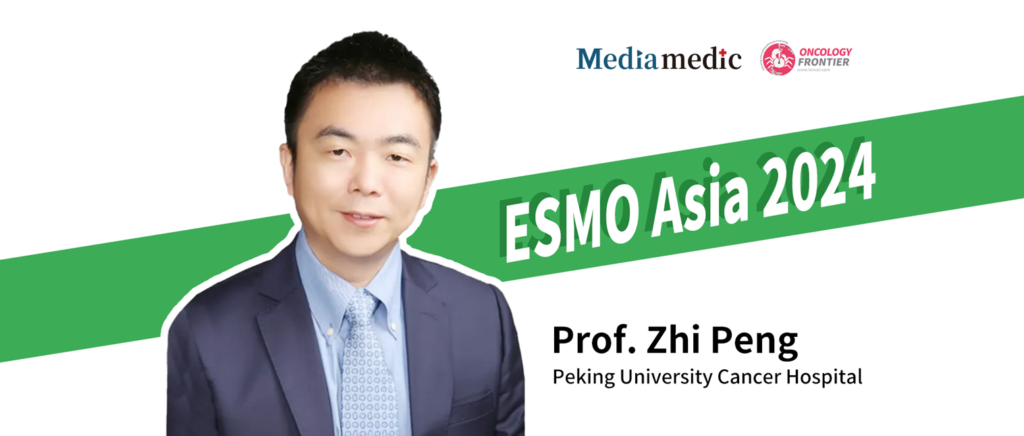
From December 6–8, 2024, the ESMO Asia Annual Meeting was held in Singapore, presenting groundbreaking research in oncology. Among the key highlights was the DESTINY-Gastric06 (DG06) study, which sparked extensive discussion. Oncology Frontier invited Prof. Zhi Peng, a leading researcher and specialist from Peking University Cancer Hospital, to share the latest findings from the DG06 study and insights into the role and future potential of antibody-drug conjugates (ADCs) in cancer treatment.Oncology Frontier: Prof. Peng, you presented the DESTINY-Gastric06 study results at the meeting. Could you provide some background on the study and summarize its main findings?
Prof. Zhi Peng: The DESTINY-Gastric06 (DG06) study was a single-arm phase II trial conducted among a Chinese population, with the primary endpoint being the objective response rate (ORR) evaluated by independent central review (ICR) based on RECIST v1.1 criteria. The trial assessed the efficacy and safety of trastuzumab deruxtecan (T-DXd) in patients with advanced HER2-positive gastric cancer.
As per the study results, China has approved T-DXd for late-line treatment in patients with HER2-positive gastric cancer.
The study enrolled 73 patients whose HER2-positive status was confirmed centrally. The ORR by ICR was 28.8%, and the investigator-assessed ORR was 37%. The median progression-free survival (PFS) was 5.7 months, and the median overall survival (OS) reached 12 months.
Based on these findings, the National Medical Products Administration (NMPA) approved trastuzumab deruxtecan for the treatment of adult patients with locally advanced or metastatic HER2-positive gastric or gastroesophageal junction adenocarcinoma who had previously received at least two systemic therapies.
Oncology Frontier: What is the current safety profile of ADC drugs, and how can clinicians identify and manage ADC-related adverse reactions?
Prof. Zhi Peng: ADCs represent a diverse category of drugs, and their safety profiles can vary significantly depending on the specific compound. For DS-8201 (trastuzumab deruxtecan), data from studies such as DESTINY-Gastric01 (DG01), DESTINY-Gastric02 (DG02), and our ongoing DG06 trial indicate that its safety profile is relatively manageable. The primary safety concerns are hematologic toxicities.
In the DG06 study, only 3 patients (3.2%) experienced interstitial lung disease (ILD): 2 cases were Grade 1, and 1 was Grade 2. All were effectively managed and controlled. While hematologic toxicities pose some risk, they are common and generally controllable for oncologists. Importantly, clinical practice requires tailored safety management protocols specific to each ADC drug to ensure patient safety.
Oncology Frontier: How effective are ADC combination therapies in HER2-positive gastric cancer? Are there any ongoing explorations in this area?
Prof. Zhi Peng: HER2-positive gastric cancer is among the subsets of gastric cancer that respond relatively well to targeted therapies. From the early use of trastuzumab to trastuzumab-chemotherapy combinations and the inclusion of pembrolizumab in the KEYNOTE-811 trial, treatment options for this population have significantly expanded.
Currently, drugs such as vidicitumab and trastuzumab deruxtecan are approved as late-line therapies for HER2-positive gastric cancer. Moreover, multiple combination therapy strategies are under investigation. For example:
- Based on the results of DESTINY-Gastric03, trastuzumab deruxtecan will be included in the global DESTINY-Gastric05 trial to explore various combination regimens.
- Vidicitumab is undergoing clinical trials for frontline treatment.
- Global multicenter studies are now enrolling for HER2-targeting bispecific antibodies.
In summary, numerous drugs targeting HER2 are in development, including monoclonal antibodies, bispecific antibodies, and ADCs. These drugs are being investigated in a variety of combination strategies to enhance efficacy.
Oncology Frontier: ADCs are often referred to as “intelligent targeted therapies.” Do you think ADCs will replace traditional chemotherapy in the future?
Prof. Zhi Peng: I don’t believe ADCs will completely replace chemotherapy, and there are two main reasons for this. First, ADCs require the presence of specific targets. Second, their mechanisms differ fundamentally from those of chemotherapy.
For patients with suitable targets, ADCs may replace chemotherapy in certain settings. Additionally, ADCs have inherent molecular and biological advantages. For instance, ADCs targeting TROP2 appear effective regardless of TROP2 expression.
Overall, ADCs represent a rapidly advancing field. However, significant exploration is still needed to fully understand their applications across various tumor types, drugs, and targets. This presents an exciting frontier in oncology research.
Prof. Zhi Pen
- Doctoral supervisor at Peking University Cancer Hospital
- Chief physician and associate professor in the Department of Gastrointestinal Oncology
- Member of various committees, including: The Chinese Anti-Cancer Association’s Tumor Precision Therapy Committee The Chinese Anti-Cancer Association’s Tumor Metastasis Committee The Chinese Anti-Cancer Association’s Tumor and Microecology Committee The CSCO Tumor Nutrition Committee The Clinical Immunology Branch of the Chinese Society of Immunology
- Vice Chairman of the Digestive Tract Precision Therapy Committee, Beijing Anti-Cancer Society
- Secretary-General of the Gastric Cancer Prevention Committee, Beijing Anti-Cancer Society
- Editorial board member of Chinese Medical Journal and Tumor Comprehensive Treatment Electronic Journal
- Recipient of the Chinese Medical Association First Prize, the Chinese Anti-Cancer Association Young Scientist Award, and the Chinese Anti-Cancer Association First Prize


